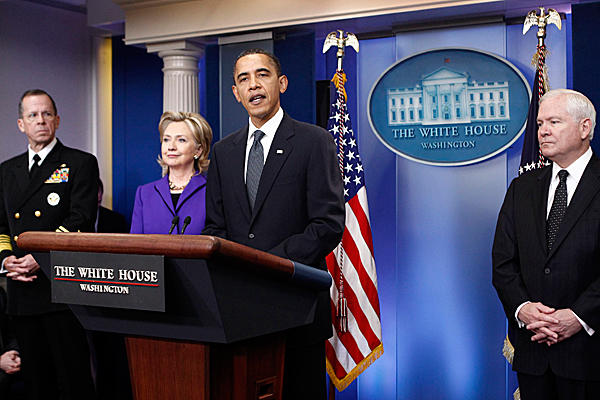
The United States and Russia have agreed to reduce their nuclear arsenals by a third. This is not only good political theater but actually useful.
UPI gives a useful overview of the agreement and rollout:
U.S. President Barack Obama and his Russian counterpart Dmitry Medvedev announced agreement Friday on a nuclear arms reduction treaty.
The deal, which cuts the number of warheads from 2,200 to 1,550 warheads, replaces the 1991 Strategic Arms Reduction Treaty.
"With this agreement, the United States and Russia — the two largest nuclear powers in the world — send a clear signal that we intend to lead," Obama said Friday at the White House. "By upholding our own commitments under the Nuclear Non-Proliferation Treaty, we strengthen our global efforts to stop the spread of these weapons and to ensure that other nations meet their own responsibilities."
Both powers had agreed to substantial cuts last year but differences on verification delayed final treaty wording. The new agreement is expected to be signed early next month in the Czech Republic.

Now, as Josh Rogin aptly documents, this treaty is exceedingly unlikely to get the needed 67 votes in the United States Senate necessary for ratification. In addition to an overall desire to thwart President Obama on, well, just about everything, several key Republicans have a legitimate quarrel with the treaty’s inclusion of language linking arms reduction and missile defense in Eastern Europe. (There’s a throwaway line in the Preamble saying that offense and defense are, of course, linked. But the treaty imposes no limits on the latter.)
But the president doesn’t need a formal treaty to draw down our nuclear arsenal. The only advantages a treaty would confer is to force Obama’s successors to continue to abide by the limit and as a show of good faith to secure Russian cooperation. In this case, however, neither of those assurances is necessary: It’s just too good a deal for both sides.
And it’s not because the deal will have any significant impact on nuclear proliferation or take us as a CSM headline puts it, "closer to a nuclear weapons-free world." No, those remain wild fantasies.
The bottom line is that there’s simply no conceivable reason for the United States and Russia to maintain such massive stockpiles. Both countries have, quite easily, more than twice the number of strategic weapons as the rest of the planet combined. So easily, in fact, that it will still remain the case once we’ve cut to the new limits. France, the third most dominant nuclear power, has 300 warheads. China has 180 and the UK 160. Having 1550 warheads — or, indeed, 550 warheads — would still be more than adequate to meet any possible deterrent need.
As a senior White House official told me in a blogger conference call, the treaty is also important because the old inspections regime expired December 5th and we very much want to have the confidence building that vigorous inspections provide. But, frankly, it’s in United States interests to reduce our arsenals irrespective of what the Russians do.
More to the point, the cuts are not only symbolically important in signaling reduced tension between the former Cold War superpowers but they’re pure win. At zero loss of security or the sense thereof, the two powers shed a massive problem: large stockpiles of rapidly decaying, obsolete weapons that must be maintained, safeguarded, and otherwise dealt with at great cost. Cutting back by a third is better than printing money. And both sides could use a little more cash right about now.
James Joyner is managing editor of the Atlantic Council. Top photo: Kevin Lamarque/Reuters. Chart: CSM.
Image: obama-announces-nuke-deal.jpg
